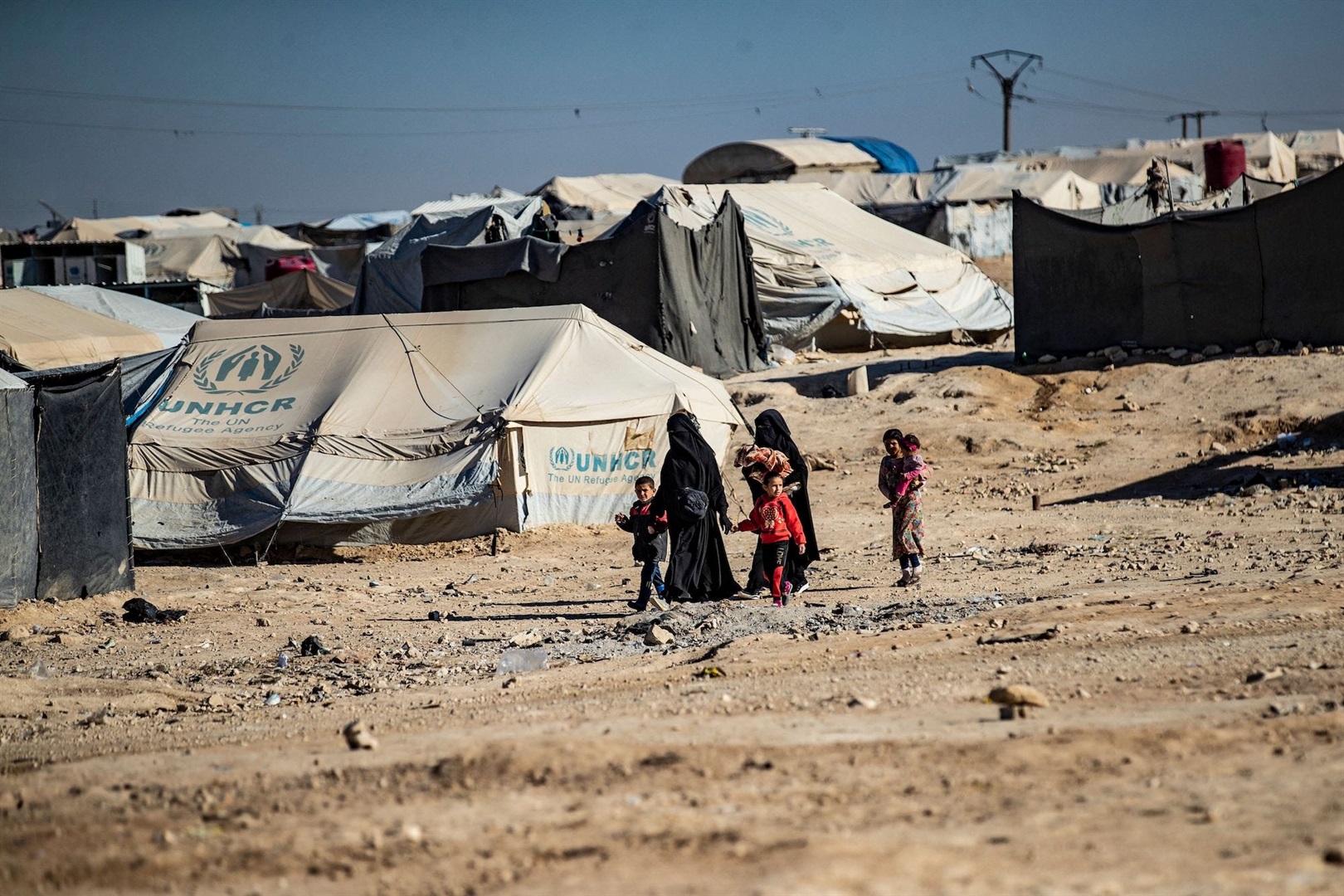
The South African government should repatriate or help bring home about 17 of its nationals detained for years in camps in Syria. It should help rehabilitate and reintegrate the returnees, recognising that children are victims of ISIS and that many women may be, too, writes Letta Taylor.
"I’m an 'accidental terrorist,'" Khadija, a 54-year-old South African woman, told me with a rueful laugh. She was seated in a battered tent in Roj, a detention camp on a windswept desert in northeast Syria. "Coming in was easy. Getting out? Not so easy."
Khadija has been trapped in war-wracked Syria since 2015 when she embarked on what she calls a failed quest to rescue three young family members living under the Islamic State (ISIS). She is now among an estimated 17 South Africans detained for years in camps in northeast Syria as ISIS suspects and family members.
The South Africans include four women and 13 children, one just two years old, family members say. They are held in horrific conditions made even more life-threatening by recent Turkish air strikes against the Kurdish-led forces who guard them. None of these South Africans has been charged with a crime. The South African government should resume its aborted efforts to bring them back.
Rocks thrown
Hundreds of detainees have died in Roj and al-Hol, the two camps in northeast Syria holding thousands of foreign women and children for alleged ISIS links. One was a South African mother. Many were children who died of preventable illnesses. Others were murdered by detainees loyal to ISIS, burned in tent fires, drowned in sewage pits, or hit by water trucks.
The detainees have no way to challenge their detention. Women in the camps told me hardline ISIS detainees threaten and throw rocks at those who want to go home.
Khadija does not fit the profile of most women held in the camps. Unlike most foreign female detainees, who came to Syria as young women or girls, she is now a grandmother. Most of the women say they were trafficked into ISIS, brought by male relatives, or joined voluntarily, but Khadija insists she came on a naïve rescue mission.
Her aim, Khadija told me when I met her in Roj in May, was to bring home two nieces and a nephew, the children of a brother who joined ISIS. But when she arrived, she said, her brother refused to let the children go.
"The next thing I knew, I was out on the street in Syria, with no Arabic," Khadija said, and she knew ISIS killed or imprisoned those who tried to leave. Khadija said she survived by moving in with widows of ISIS fighters, cleaning and caring for their children. When she finally managed to flee ISIS in 2018, she was picked up in northeast Syria by the Syrian Democratic Forces, a Kurdish-led, US-backed group fighting ISIS. Regional forces held her first in prison, then al-Hol, then Roj.
No medical attention
Like other camp detainees, Khadija lacks adequate medical care though she suffers from grave illnesses that have left her largely immobile and without vision in one eye. She and the other detainees also lack adequate food, clean water, and shelter. Although most of the 17 South Africans, including Khadija's nieces and nephew, also ended up in Roj, they can only visit Khadija twice a year.
In 2021, South Africa tried to repatriate its nationals, but the deal collapsed at the last minute. "We were packed and ready to go," another South African woman in Roj said.
The setback stemmed from diplomatic sensitivities, informed sources said. South Africa has diplomatic relations with the Syrian government, complicating its negotiations with the detaining authorities in nominally autonomous northeast Syria. But at least 34 countries have repatriated nationals from northeast Syria, including some with diplomatic ties to Damascus, such as Kazakhstan, Russia, and Tajikistan.
The South African government should repatriate or help bring home its nationals before any more die in northeast Syria. It should help rehabilitate and reintegrate the returnees, recognising that children are victims of ISIS and that many women may be, too. Adults can be prosecuted if warranted.
In other countries, children who have been brought home from al-Hol and Roj are doing remarkably well, Human Rights Watch found.
I can't vouch for Khadija’s motives for going to Syria, but I can attest to her regret and despair that she may never again see her children or meet her grandchildren back in South Africa. "I wouldn’t like to die here," she said.
Surely the South African authorities can act before it comes to that.
- Letta Tayler is an associate crisis and conflict director at Human Rights Watch and the author of the new report "Syria: Repatriations Lag for Foreigners with Alleged ISIS Ties." Follow her on Twitter @lettatayler
*Want to respond to the columnist? Send your letter or article to opinions@news24.com with your name and town or province. You are welcome to also send a profile picture. We encourage a diversity of voices and views in our readers' submissions and reserve the right not to publish any and all submissions received.
Disclaimer: News24 encourages freedom of speech and the expression of diverse views. The views of columnists published on News24 are therefore their own and do not necessarily represent the views of News24.




 Publications
Publications
 Partners
Partners























